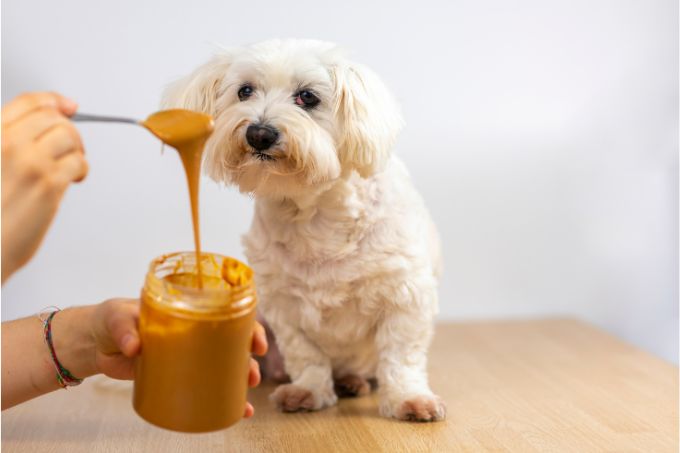This post may contain affiliate links, which means we may receive a commission from purchases made through these links. See our affiliate disclaimer.

Peanut butter is yummy, inexpensive, easy to find, and easy to store. It’s convenient to have on hand, and an excellent snack — in a sandwich, and sometimes just a spoonful on it’s own, if we’re being honest.
But can dogs eat peanut butter? We answer this question below, plus how much peanut butter is safe, and a few safety tips when consuming peanut butter.
Can dogs eat peanut butter?
Yes, dogs can eat peanut butter. Most types of peanut butter, including creamy & crunchy peanut butter, are safe for dogs to eat. Unsalted, natural peanut butter is the healthiest kind, and peanut butter made specifically for dogs would be best. Homemade peanut butter also works, just make sure it doesn’t contain any sugar or other additives.
We love using peanut butter as an occasional treat, for coating pills that need to be taken, for baking doggy desserts, or for training dogs.
Health benefits of peanut butter for dogs
Peanut butter is a great source of healthy fats like oleic acid & omega-6 fatty acids (linoleic acid), plus plenty of these vitamins & minerals:
Given in moderation, these fats, vitamins and minerals support brain health, boost the immune system, and give dogs’ coats a nice shine.
How much peanut butter can dogs eat?
Peanut butter is high in fat and packed with calories — one tablespoon contains about 95gm of calories. Dogs that get too much peanut butter are at risk of obesity, and other complications of a high-fat diet.
The exact amount is hard to pin down, and depends a lot on your dog’s size. As a general guide, we recommend no more than 1/2 tsp per day for small dogs and 1 tbsp per day for medium & large dogs.
We advise using peanut butter as an occasional treat instead of a daily one. When coating pills in it for your dog, a light coat will usually do the trick.
What to watch out for when giving peanut butter to dogs
Avoid Xylitol
Other than added sugar and added salt as discussed above, you’ll want to look out for any sign of Xylitol in the ingredient list.
Xylitol is often used as a sugar substitute, and, while safe for humans, is toxic to dogs, even in small quantities according to the FDA.
If you suspect your dog has eaten any food with Xylitol, contact your vet immediately. Signs of Xylitol poisoning to watch out for include weakness, loss of balance, loss of consciousness and seizures.
Peanut allergies in dogs
Peanut allergies in dogs are uncommon, but they are still possible.
As with any other new food, you’ll want to give your dog a small quantity at first, and observe for signs of an allergy. Some of the common signs of an allergy include skin symptoms (such as itching, redness, hair loss) and stomach symptoms (vomiting, diarrhea).
If you notice any such signs, stop giving your dog peanut butter immediately, and speak to a trusted vet urgently.

